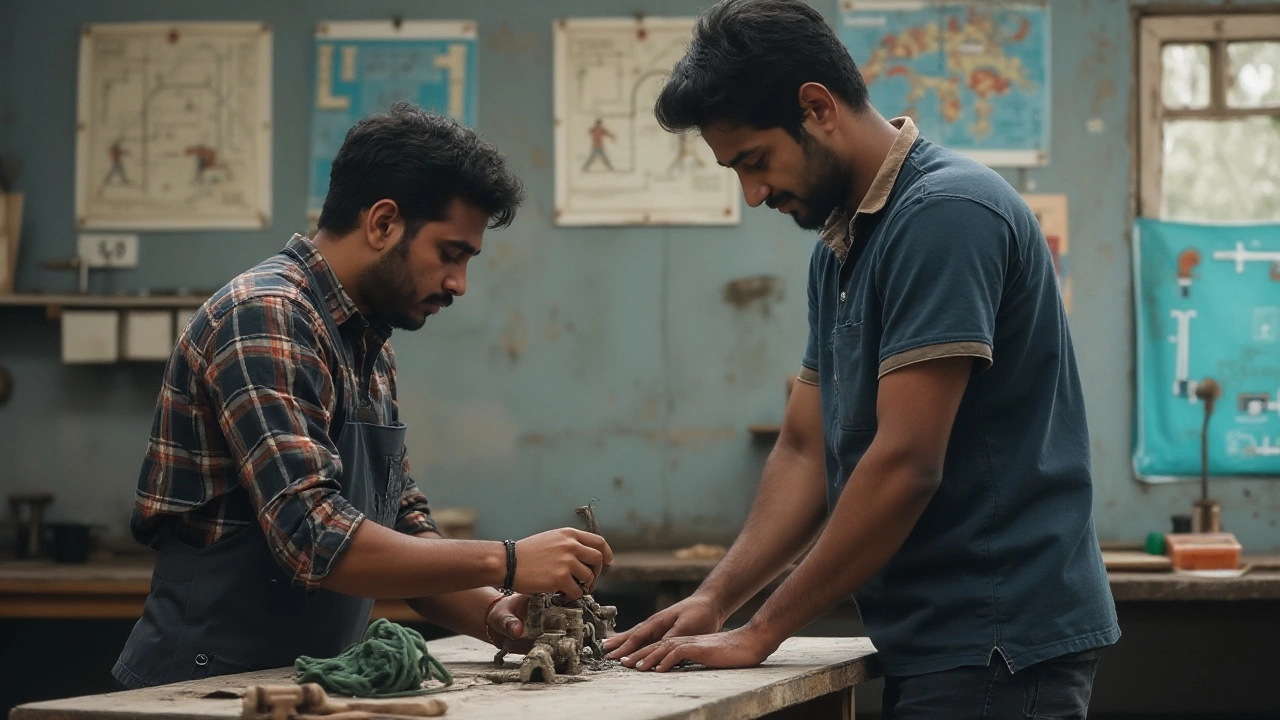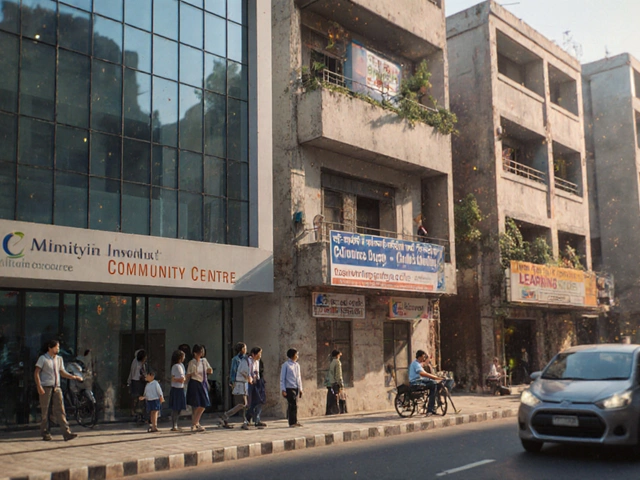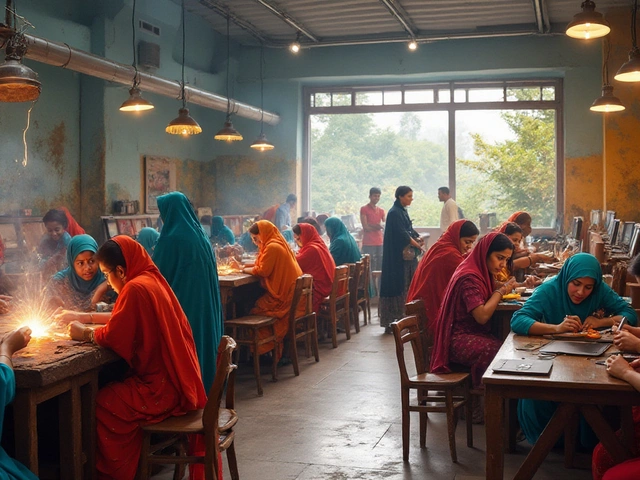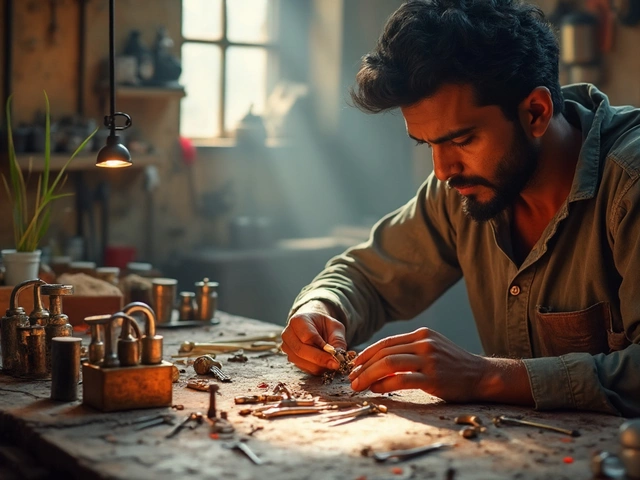Plumbers serve a fundamental role in our society, ensuring that water systems are running smoothly and efficiently. Without their expertise, homes and businesses would face significant disruptions, from leaking pipes to blocked drains. Despite this vital contribution, many wonder why their services command such high fees. This often boils down to the technical expertise they wield and the complex problem-solving required on the job.
Unlike many professions, plumbing combines both mental and physical demands, and the intricate nature of pipe systems requires painstaking precision and skill. Comprehensive training and certification are necessary to hone these skills, which can last several years. It's not just about fixing a leaky faucet; it entails understanding intricate systems and diagnosing issues that aren't always apparent at first glance.
Then there's the unceasing demand for plumbing services. As urban areas expand and infrastructure ages, the need for skilled plumbers doesn't wane. This constant demand, along with the often challenging work environment, contributes to the lucrative compensation plumbers receive. Moreover, the profession involves dealing with potential hazards, adding another layer to its skilled nature.
- The Essential Role of Plumbers
- Skills and Training Required
- The Ongoing Demand for Plumbing Services
- Job Hazards and Complexities
- Pathways to a Plumbing Career
The Essential Role of Plumbers
Plumbers are the unsung heroes of modern society, playing a critical role in maintaining the infrastructure that keeps our daily lives flowing smoothly. Without their expertise, homes, businesses, and public spaces would descend into chaos with leaks, faulty installations, and sanitation issues. Plumbers ensure that clean water is available at our fingertips and waste is efficiently disposed of. Their work extends far beyond the occasional leaky faucet, as they are often tasked with installing complex systems in both residential and commercial properties.
One fascinating aspect of plumbing is its rich history, stretching back thousands of years. The ancient Romans were pioneers in plumbing, introducing aqueducts and sophisticated waste management techniques that set the standard for modern systems. Today’s plumbing jobs are built on this historical foundation, yet they also require a mastery of modern technology and materials. A plumber must be well-versed not only in traditional practices but also in cutting-edge advancements like smart water systems and eco-friendly retrofit technologies that conserve water and energy.
"Plumbing is more than just connecting pipes. It's about ensuring the health and safety of the community by providing one of life's most essential services," says the National Association of Plumbing, Heating, and Cooling Contractors.
The skill set a plumber needs goes beyond physical dexterity and strength. Logical problem-solving skills and the ability to follow precise technical plans are vital. Plumbing installations need to adhere to strict codes and regulations to ensure safety and functionality. A small error in installation or repair can result in significant consequences, including property damage or health risks, making attention to detail imperative. Not surprisingly, many plumbers are also adept at working under pressure, often being called upon to fix urgent issues that require immediate solutions. Their ability to remain calm and methodical in such situations underscores their indispensable role.
Given the continuous demand for their expertise, plumber salaries have risen accordingly. According to recent industry reports, the average annual salary for a plumber in the United States hovers around $55,000, with experienced professionals earning much more. This is not just a reflection of the difficulty of the work involved, but also of the vital necessity of their services. The continuous need for plumbing services in both new constructions and older building maintenance ensures that skilled plumbers remain in high demand. From installing cutting-edge systems in high rises to ensuring clean water access in suburban homes, their work touches all sectors and aspects of life, reinforcing their essential role in our society.
Skills and Training Required
Embarking on a journey to become a skilled plumber involves much more than wielding a wrench and plunging into blocked pipes. It requires a blend of technical know-how and hands-on expertise that must be nurtured over time. Aspiring plumbers typically start their careers through apprenticeships, which offer both theoretical knowledge and practical experience. These programs can last anywhere from two to five years, depending on the region and specific requirements. During this period, apprentices learn critical skills under the watchful eyes of seasoned professionals, which is crucial given the intricacy of modern plumbing systems.
Plumber training covers various areas, from reading blueprints and understanding plumbing codes to mastering the installation of water systems and sanitation drainage. Trainees become adept in using a wide array of tools and materials, each suited to different situations. For instance, working with copper pipes requires precision in soldering, while plastic pipes demand knowledge of solvent welding. The coursework also delves into mathematics and science, emphasizing problem-solving and design skills needed to tackle any plumbing challenge effectively.
Another fundamental aspect of this training process is safety. Plumbing isn't without its dangers; handling pressurized equipment and hazardous materials is part of the job. As such, courses focus on instilling safety protocols to mitigate risks, which protects both the plumber and the client. Beyond the technical realm, interpersonal skills are often overlooked but are equally important. A plumber must communicate efficiently with clients, interpret their needs accurately, and provide assurances regarding job execution. Such softer skills are as vital as any technical acumen.
"A balanced mix of academic learning and hands-on training is critical," says Jane Cunningham, an expert in vocational education. "This dual approach ensures that plumbers are well-rounded and prepared for real-world challenges."
Upon completing their apprenticeship, many plumbers choose to sit for a licensing exam, which is mandatory in most areas. Securing a license not only magnifies their credibility but often leads to better job opportunities and higher earning potential. Thus, continuous education plays a crucial role in this field. With plumbing systems and technologies evolving, professionals must stay abreast of new developments. Whether through workshops, courses, or certifications, ongoing learning is a staple in a plumber's career.

The Ongoing Demand for Plumbing Services
The demand for plumbing services is fueled by several factors, making it a consistently high-need profession despite economic fluctuations. First, let's consider the growth of urban areas. As cities expand and new buildings are constantly constructed to accommodate a growing population, the need for plumbing systems also increases. These systems are not just essential in residential complexes, but are critical in commercial spaces, factories, and high-rise skyscrapers, requiring skilled plumbers to design and maintain them effectively.
Additionally, aging infrastructure is a prominent challenge faced by many regions around the globe. Homes that have stood for decades, or even centuries, often require updates to their plumbing systems to meet modern standards and efficiency requirements. Regular maintenance and unexpected repairs are non-negotiable, creating a steady stream of plumbing jobs that cannot be outsourced or automated.
The modern emphasis on sustainability and water conservation has also brought about an increased demand for plumbers. More homeowners and businesses are looking to upgrade their systems with water-saving technologies, from eco-friendly toilets to advanced irrigation setups. This shift not only calls for installers but also experts who can assess existing systems and recommend eco-efficient alternatives. A plumber's role in advising on and installing such innovations places them at the forefront of building a more sustainable future.
The demographic shifts also play a noteworthy role. As the population ages, there is a greater need for accessibility modifications, including specialized plumbing installations such as walk-in baths and specialized fixtures. Such installations require not only expert technical skills but also a keen understanding of safety and accessibility standards. This adds another layer to why the services of a trained plumber are indispensable.
Interestingly, the pandemic period highlighted another crucial aspect. As people spend more time at home, the wear and tear on household systems including plumbing increased significantly. The demand for home repairs and enhancements surged, which naturally translated into heightened need for plumbing services. A survey from the National Association of Home Builders indicated a 58% increase in home improvement projects in 2021, many involving plumbing systems.
"Plumbers have the unique advantage of offering essential services that are always in demand, owing to both infrastructure needs and the move towards more water-efficient environments." – James M. Seay, Plumbing Economist
Moreover, there is a noticeable shortage of skilled tradespeople, including plumbers, which has been highlighted by various industry reports. This shortage is partly due to fewer young people entering trades, preferring instead careers perceived as less labor-intensive. This demographic gap increases the value of those who possess the requisite skills and qualifications, contributing to higher earnings for practitioners in the field.
In essence, the plumber training and expertise are never stagnant, adapting continuously to meet both technological advances and societal needs. The varied and evolving demands for plumbing work ensure that it remains a profession not just of present significance, but one geared towards future infrastructural resilience and sustainability.
Job Hazards and Complexities
Plumbing is not just a matter of twisting a wrench here and there. It involves navigating a landscape riddled with potential hazards and complexities that demand precision and extensive knowledge. Anyone who has ever tried their hand at fixing a minor plumbing issue might marvel at a plumber's resilience and expertise. One of the stark realities of being a plumber is the continuous exposure to tricky and potentially hazardous conditions. Plumbing tasks frequently require accessing cramped, dim spaces that are difficult to work in and often contain unforeseen challenges.
For instance, plumbers regularly deal with heating systems, risking exposure to high temperatures that can be perilous if not handled correctly. Other occupational hazards include sewage exposure, which carries the risk of severe biological hazards, making protective gear an indispensable part of a plumber's toolkit. In addition to these, the prolonged exposure to toxic chemicals in various plumbing materials raises significant health concerns over time. Handling these materials safely requires not only physical dexterity but also a comprehensive understanding of safe handling practices.
The complex aspects aren't limited just to physical dangers; plumbing also involves a mental rigour akin to solving a dynamic, intricate puzzle. Each project is unique, from residential repairs to industrial installations, requiring plumbers to come up with off-the-cuff solutions that are both effective and efficient. The necessity for real-time decision-making amid the pressure of a job site is something only seasoned plumbers can pull off successfully. According to a report by the UK Health and Safety Executive, "manual handling and working in awkward postures remain significant factors in occupational illnesses among plumbers, highlighting the physical strains involved."
Let's not forget the technological dimension added to modern plumbing. Advancements in technology mean that plumbers need to regularly update their skills to stay relevant and efficient in their work. Tools and methodologies continue to evolve, presenting both opportunities and challenges. Complex systems such as smart homes require an understanding that goes beyond traditional plumbing practices. These developments require a hybrid skill set that merges traditional plumbing skills with a keen understanding of modern technology. This continuous burden of adaptation underscores why plumbers are paid handsomely for their versatility and expertise.

Pathways to a Plumbing Career
Starting a career in plumbing is like embarking on a journey that promises both challenge and reward, with each turn revealing new layers of expertise. Plumbing is not just a job but a skilled trade where dedication meets craftsmanship. At its core, this profession demands a keen understanding of water systems, rigorous hands-on training, and a problem-solving mindset that can adapt to evolving scenarios. The path usually begins with a high school diploma or equivalent, laying a foundation of basic math and science skills, which proves essential when grasping the technical aspects of plumbing systems.
Indeed, the learning curve might appear steep at first, but persistence is key. Aspiring plumbers typically start out as apprentices, a role that sees them shadowing seasoned professionals. Through these apprenticeships, lasting anywhere between two to five years, novices gather not just technical know-how, but also insights into customer interaction and business management—skills vital for those wishing to run their own businesses later. Apprenticeships are often undertaken through local unions or trade schools, each offering structured programs that balance classroom instruction with practical experience.
For those eager to jumpstart their careers quickly, vocational schools offer postsecondary certificates or diplomas. These courses, often more concentrated, can provide a head-start into the industry, equipping students with essential knowledge and reducing the apprenticeship duration. The curriculum typically covers pipe system design, safety regulations, and state codes, ensuring graduates are well-versed in the expectations set by the industry. Aspiring plumbers should strive to absorb as much as possible during this phase, as it forms the bedrock of their future expertise and success.
"The best preparation for tomorrow is doing your best today," observed H. Jackson Brown, Jr. This rings especially true for aspiring plumbers, who must constantly refine their skills as they prepare for certification exams.
Transitioning from apprenticeship to a fully-fledged plumber requires passing a licensing exam. While the specific requirements vary by region, these exams generally test knowledge in local plumbing codes, technical skills, and problem-solving acumen. Once licensed, the world of plumbing opens up wide, with opportunities to specialize in areas like pipefitting, steam fitting, or residential systems. This specialization not only enhances skill sets but also improves earning potential. Acquiring additional certifications in newer technologies, like green plumbing systems, can be a differentiator, showcasing a plumber's commitment to sustainable practices.
To truly thrive, continuous learning is crucial. The industry constantly evolves with technological advancements and changing regulations. Many plumbers choose to attend workshops, trade shows, and seminars. These events serve as a fertile ground for networking, learning about emerging tools, and keeping up-to-date with trends. As experience mounts, so does the potential for career advancement, whether it be in supervisory roles or embarking on the entrepreneurial journey of starting their own plumbing business. The satisfaction of knowing they are integral to modern comfort adds a unique layer of fulfillment to the job.




